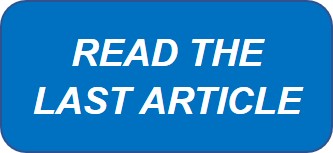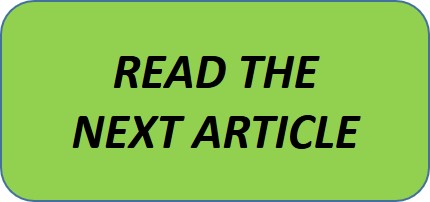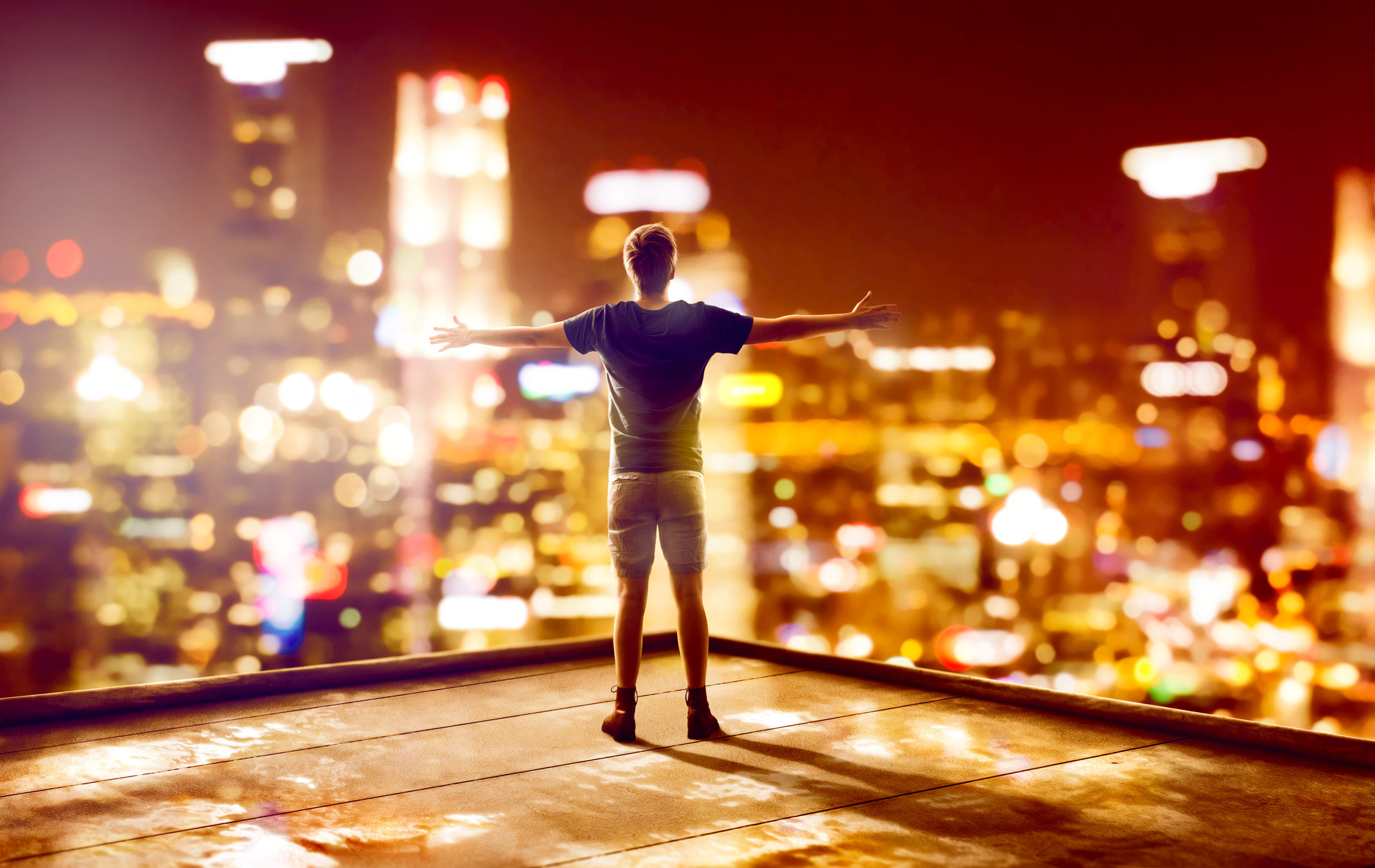 Written by Steve Gandara
Written by Steve Gandara
Again, I want to thank everyone who posted, texted, or emailed in their views on the light that is emerging in this temporarily dark moment in our history. Your insightful comments have and will continue to encourage lots of folks in the days ahead.
So far in the series we have identified that regardless of how dark things have seemed, light has been emerging all around us. We have found even more light and identified how we can create our own light. 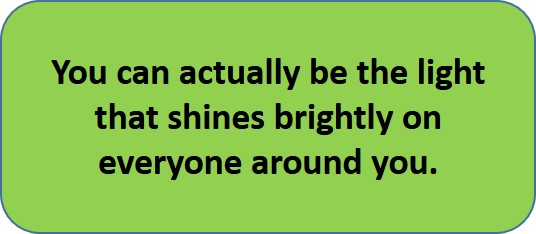 Today we are going to focus on how you can actually be the light that shines brightly on everyone around you. As you practice the tools and techniques that we’ll discuss today, you’ll see that your family, your loved ones, your team at work and even your community will begin to recognize you as the light in their darkness. You will become a beacon of light and hope to everyone around you. You will activate and draw out the best that is within them to be all that they can be and do all that they can do!
Today we are going to focus on how you can actually be the light that shines brightly on everyone around you. As you practice the tools and techniques that we’ll discuss today, you’ll see that your family, your loved ones, your team at work and even your community will begin to recognize you as the light in their darkness. You will become a beacon of light and hope to everyone around you. You will activate and draw out the best that is within them to be all that they can be and do all that they can do!
Have the Right Heart
There’s a root word in Greek that has some powerful applications. The word is “kardia.” Its simple translation to English is the word “heart.” Knowing this, it makes sense that we call a heart surgeon a cardiologist. But as with most ancient languages, not only are the words used in ancient times root words to our modern languages, they have much deeper and more versatile meanings. Even in modern English the “heart” can mean either the physical blood pumping organ in our chests or “the central or innermost part of something,” as in “the heart of the matter.” Or, we use terms like “they really don’t have the heart to do that,” meaning something totally different. Merriam Webster defines this application of the word heart as “one’s innermost character, feelings, or inclinations” which is right on the money with the ancient Greek: “the seat of spiritual life, the soul or mind, as it is the fountain and seat of human thoughts, passions, desires, appetites.” Basically, when we’re talking about someone having the “heart” to be or do something, we’re addressing this deeper more profound meaning of the word. Psychologists call this our subconscious mind. Spiritual and religious leaders can call it our soul. Regardless of application, it is where our deepest memories and core beliefs are embraced and retained.
If you’ve participated in one of our Achieving Excellent Culture Workshops, you know that our beliefs govern how we feel, how we respond to others, what we see or understand or don’t, as well as how we act or behave. If someone believes that their boss is a jerk, then they are going to behave totally differently at work than someone who believes the opposite. Also, since body language and tone of voice are more powerful at communicating to others what we really believe and how we really feel than our words are, the people around us receive feedback about what we believe regularly from these non-verbal cues. Someone could say the words “I love you” with an angry voice (even on the phone or voicemail) and whoever is on the other end of the communication would feel hate instead of love.
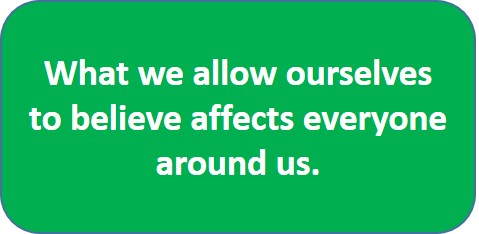 All of this being the case, what we allow ourselves to believe in our hearts (our kardias- the deepest core part of our subconscious minds or souls) is the basis of how much light or how much darkness we exude to those around us. What we allow ourselves to believe affects everyone around us even if we don’t say a word!
All of this being the case, what we allow ourselves to believe in our hearts (our kardias- the deepest core part of our subconscious minds or souls) is the basis of how much light or how much darkness we exude to those around us. What we allow ourselves to believe affects everyone around us even if we don’t say a word!
For example, the other day, I allowed myself to watch too much news, too much political junk on tv, too much social media on the crisis etc. etc. Not only did I become tired and weary, I medicated my tired and weary body by crashing and watching too much entertainment on tv to relax. As a result, not only did I feel lousy but my wonderful wife of several decades was fast and furious in my face confronting me about my bad attitude and how it was affecting the rest of the family negatively. Not a good thing when we are under the shelter-in-place work-from-home mandate. `Really not a good thing ever! It was amazing that while I had not said a word, she felt my junk as did the others around me. The point here is that whether it’s easily recognizable or not, the people around us still feel it and respond to it, even through a telephone call or video conference, our tone of voice and body language tell the whole story.
To “Be the Light” in the darkness for others in your sphere of influence requires something much deeper than believing what you hear on the news, from others around you or even how you’re feeling at any given moment. Being the light, requires several deep foundational core beliefs that you may or may not currently embrace. We will consider a few of these in this article and address more in future articles with the goal of giving you the tools to BE THE LIGHT IN THIS DARKNESS.
Recognize the Source and Power of Your Emotions
 Is how you feel at any given moment a root or a fruit? Are your feelings the source of your effect on others or are they the cause of your circumstances? Interestingly the answer is that they can be both. If you’re feeling down, we’ve already discussed how others around you can be infected. But, how does how you are allowing yourself to feel effect you?
Is how you feel at any given moment a root or a fruit? Are your feelings the source of your effect on others or are they the cause of your circumstances? Interestingly the answer is that they can be both. If you’re feeling down, we’ve already discussed how others around you can be infected. But, how does how you are allowing yourself to feel effect you?
I’ve long been a fan of the research findings of Dr. Richard J. Davidson, a neuroscientist at the University of Wisconsin-Madison. If you’ve participated in one of our Achieving Excellent Culture Workshops, you’ll recall that Dr. Davidson did the research on the effect of meditation practiced by Tibetan monks on their physical brains. He found that not only did the monks who meditated on empathy become more empathetic; the practice actually changed the physiology of their brains much like a muscle that is exercised frequently. So, according to Davidson, repetitive thought like meditation, not only effects what you believe, it affects how you feel and literally changes the physical structure of your brain.
I found a recent article in the National Institutes of Health Newsletter called Positive Emotions and Your Health. The article summarizes more of Davidson’s research describing how your emotions affect your brain, your health, your immune system, your hormones, your receptivity to viruses like the Covid-19, and most of all your resiliency emotionally as well as physically. It also clarifies how your emotions can be managed so that you’re more in charge of your life and less a victim of your surroundings and circumstances. The article is short and to the point.
This article is an absolute read if you’re going to BE THE LIGHT IN THIS DARKNESS to those who you love and lead. Positive Emotions and Your Health.
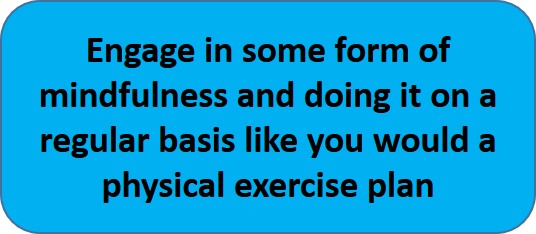 Bottom line: Learning how to engage in some form of mindfulness and doing it on a regular basis like you would a physical exercise plan will make a huge positive difference both in how you live and how you lead. Meditate, pray, revisit memories of success and victory, say affirmations, reflect and visualize the good outcomes you desire. Some or all of these will make your inner light begin to shine. Making the goal of your mindfulness practice, the experience of the emotions that you desire will fuel you to be who you really are and do what you’re called to do will make all the difference.
Bottom line: Learning how to engage in some form of mindfulness and doing it on a regular basis like you would a physical exercise plan will make a huge positive difference both in how you live and how you lead. Meditate, pray, revisit memories of success and victory, say affirmations, reflect and visualize the good outcomes you desire. Some or all of these will make your inner light begin to shine. Making the goal of your mindfulness practice, the experience of the emotions that you desire will fuel you to be who you really are and do what you’re called to do will make all the difference.
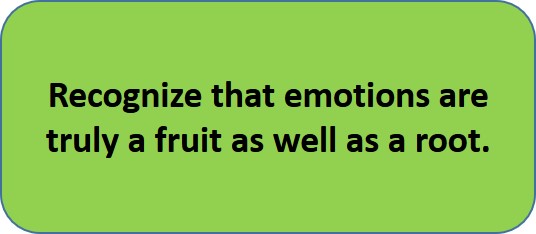 Finally, recognize that emotions are truly a fruit as well as a root. What you believe controls how you feel, not the reverse unless you allow it. Just because you feel bad doesn’t mean that you are bad or that you’re having a bad day. It all depends on what you allow yourself to believe about the situation you are in or thinking about. Emotions can lie and frequently do. If you haven’t already read it you’ll want to read the last article highlighting the research summary of Dr. Martin Seligman on the definitions of optimism and pessimism and their effect on your life and leadership, this will add a lot to your future action plan and success.
Finally, recognize that emotions are truly a fruit as well as a root. What you believe controls how you feel, not the reverse unless you allow it. Just because you feel bad doesn’t mean that you are bad or that you’re having a bad day. It all depends on what you allow yourself to believe about the situation you are in or thinking about. Emotions can lie and frequently do. If you haven’t already read it you’ll want to read the last article highlighting the research summary of Dr. Martin Seligman on the definitions of optimism and pessimism and their effect on your life and leadership, this will add a lot to your future action plan and success.
Develop an Abundance Mentality
Several years ago, I met an amazing young economist by the name of Paul Zane Pilzer. At the time Paul, a Wharton School grad, a Professor of Economics at New York University, a previous economic advisor to the President of the US, bestselling author and an entrepreneur who started and ran an educational tech business. If you think that’s a diverse full life, he’s also an ordained Jewish Rabbi. Whoa, what a resume! Bottom line, Paul is a very smart and extremely versatile guy.
The better we got to know each other, the more I was amazed by his story. As I recall he’d wanted to be an economist from the time of his childhood. I still remember the funny story of how he tried to explain the difference between an economist and an accountant to his mother. I think she finally ended up being happy that she raised a successful young man with some deep solid beliefs and values that he had chosen to live by.
According to my memory of Pauls’ story, when he began the study of economics, he had a very difficult time accepting much of John Maynard Keynes’ traditional theory of economics. Keynesian Economics as taught to university sophomores for the last several decades asserted that scarcity of resources had an impact on fundamental economics, hence the proverbial supply and demand curve.
According to Paul, he could never bring himself to buy the fact that scarcity of resources was a reality. Because his Jewish upbringing taught him that God was an abundant God and that the earth was created out of abundance, he just could not grasp the concept of scarcity. He believed that scarcity was a false reality and that it only existed when people believed that it was a reality. Ultimately when he got to his post grad work, he set about developing his own economic theories proving that scarcity is only a reality when people believe it is. As I recall, his two case studies were so well established that he became the first professor in the history of New York University to be allowed to use his own books as texts for his economics classes.
He cited a few fundamental aspects in his work as an economist that are critical for all of us who lead others:
- When people believed that scarcity was a reality, they shut down, stopped inventing and creating new solutions to problems and became victims of the scarce reality that they accepted while they waited for
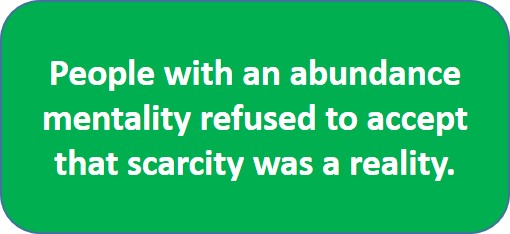 someone else to solve the problem that the perceived scarcity presented.
someone else to solve the problem that the perceived scarcity presented. - Conversely, people with an abundance mentality refused to accept that scarcity was a reality. They began to search for solutions to the problem of scarcity that confronted them and did not stop until they found or created it. In his best-selling Economics books (Unlimited Wealth and God Wants You to be Rich)
 he tells the story of his case study on the gas crisis way back in 1979. How it caused some people to stand in line at the gas pump waiting for their ration of fuel and others to invent the fuel injector and oil fracking that solved the crisis. Paul’s assertion is that there never was a real crisis-only a crisis of what people allowed themselves to believe.
he tells the story of his case study on the gas crisis way back in 1979. How it caused some people to stand in line at the gas pump waiting for their ration of fuel and others to invent the fuel injector and oil fracking that solved the crisis. Paul’s assertion is that there never was a real crisis-only a crisis of what people allowed themselves to believe. - A scarcity mentality causes people to hoard and protect what they have while an abundance mentality causes people to share and help each other improve and overcome. It also activates their creative abilities to INVENT THE HOW or strategy, instead of waiting for someone else to do it. You see a beautiful example of how this mindset works in the true story movie Apollo 13 where Gene Kranz, NASA Flight Director and manager declared that FAILURE WAS NOT AN OPTION and refused to accept that the entire flight crew were going to die in space. The result: Creativity that turned spare parts and duct tape into a lifesaving strategy and the phrase “Houston we have a problem” becoming famous.
- His second case study on the invention of the video cassette tells the story of how Sony, who invented the original video cassette (Betamax in 1975) believed that scarcity would make them rich and refused to share their proprietary technology with anyone. To counter this, JVC invented the VHS (Video Home System) in 1976 and deployed an abundance strategy licensing their technology to multiple manufacturers. Guess who ended up owning the market?
As my recollection serves me, he wrapped it all up in the fable of what he referred to as “Pilzer’s Island.” According to Paul the desolate island in the isolated south pacific was inhabited by natives who survived on the harvest of coconuts, fishing and cultivating pineapples. As the natives survived peacefully with each other, an economy emerged trading pineapples for coconuts and fish for both etc. Everyone shared and traded peacefully, and the small economy began to flourish abundantly.
Eventually what economists call specialization of labor emerged. The best fishermen did better by putting all their time and energy into fishing and then traded their harvest to the best coconut harvesters and pineapple farmers and vice versa. As long as they lived in what Pilzer called a “Culture of Love,” everyone prospered abundantly and peacefully. This persisted until scarcity fear tempted one individual to attempt cornering the market on their commodity and they succumbed. Scarcity prompted greed and greed prompted more of the natives to hoard their commodity and attempt to take over others in the same business. The result: strife and collapse of the once thriving economy. The culprit: A Scarcity Mentality.
If you listen closely to the news and follow social media today during the so called Covid-19 Crisis, this same culprit is alive and well and unfortunately thriving. When the culprit gets control over our emotions and our emotions take over our choices, we are all in deep trouble.
What’s in Your Heart?
A wise ancient multi-billionaire king once penned a proverb to help his subjects keep their priorities straight: “Keep vigilant watch over your heart; that’s where life starts.”
Bottom Lines to Being the Light
- Continuously assess and keep a diligent watchful eye on what you allow yourself to believe as “TRUTH.”
- Pay close attention to feedback from others who you trust and admire because of the light that they exude for insights into darkness that you might be unknowingly embracing in your own heart and change what you allow yourself to believe.
- Make your beliefs determine your emotions rather than how you feel become what you allow yourself to believe.
- Practice some or numerous forms of mindfulness daily: meditate, pray, revisit memories of past success and victory, say affirmations, reflect and visualize the good outcomes that you desire.
- Look for abundance in every situation and circumstance and do not allow yourself to stop looking until you find it and act on it.
- Refuse to allow a scarcity mindset to dominate your thinking, your family, or your team. Abundance is there, you just need to find it.
- Constantly challenge yourself, your family, and your team to invent new strategies and methods to manifest light, abundance, and flourishing innovation.
I am certainly no expert, just an intentional observer who cares about you, your business, your team, your family and most of all, your future. I might even be wrong or ever worse than that, “Controversial.”
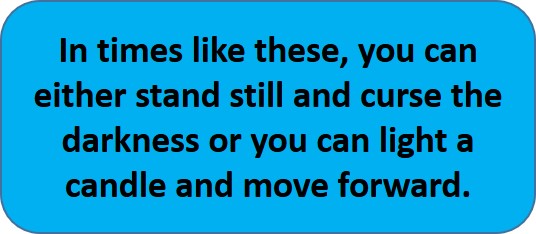 Yet, there is one thing I know is ABSOLUTELY CERTAIN: “IN TIMES LIKE THESE, YOU CAN EITHER STAND STILL AND CURSE THE DARKNESS OR YOU CAN LIGHT A CANDLE AND MOVE FORWARD.” Imagine what a difference we can make if all of us intentionally light just one candle for someone else every day!
Yet, there is one thing I know is ABSOLUTELY CERTAIN: “IN TIMES LIKE THESE, YOU CAN EITHER STAND STILL AND CURSE THE DARKNESS OR YOU CAN LIGHT A CANDLE AND MOVE FORWARD.” Imagine what a difference we can make if all of us intentionally light just one candle for someone else every day!
STAY SAFE, BE WELL, DREAM BIG and PASS IT ON!
#AmericaWorksTogether #AmericaUnited
